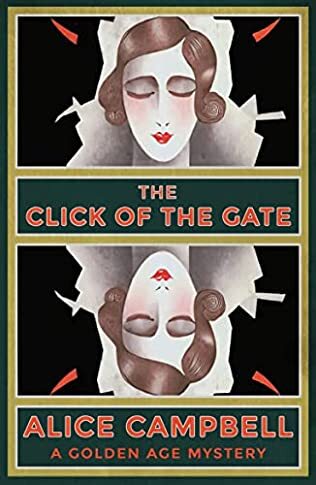The Click Of The Gate

A review of The Click of the Gate by Alice Campbell
I am still not sure about Alice Campbell. The Click of the Gate, her fifth crime fiction book, originally published in 1932 and now reissued thanks to the sterling efforts of Dean Street Press and Steve Barge, is part thriller, part romance with a bit of detection thrown in. It is enjoyable, albeit a bit predictable and a tad overlong.
The central plotline is intriguing enough and is set in Paris. The 15-year-old daughter of Iris de Betincourt mysteriously disappears into thin air in the few seconds that it took her to get out of a car, open and shut the gate to her house, from which the book derives its title, and before reaching the front door, which her mother had opened to welcome her return. There were no signs of a struggle, and the girl uttered no scream. What had happened to her?
The de Betincourts were estranged, and Iris was seeking a divorce, not least because she was falling in love with Alan Charnwood, from whose perspective the story is seen, although Campbell, rightly, chose to write the story in the third party. Charnwood, who was due to travel down to Marseilles and then pick up a boat to Uganda to resume his military service, changes his plans to console Iris and to help solve the mystery and return the girl to her mother.
Others seem anxious to get Charnwood out of the way and even though he has been granted compassionate leave, he keeps receiving communications to return to active service straight away. Fortunately, in a rare outbreak of good sense he decides to check the veracity of the recall, no easy matter in a time when telegrams and the uncertain connections of the telephone system were the only speedy means of communication.
Although a metaphorical brick and anxious to help a damsel in distress, he is a bit dim, taking the wrong course or failing to interpret the evidence of his own eyes. Fortunately, he bumps into Tommy Rostetter, an American journalist in Paris and for a crime novelist who has no series sleuth, is one of Campbell’s occasional detectives. He beavers away in the background, throwing up more acute observations of what is going on, often to the blinkered dismay of Charnwood, and working alongside Inspector Maupin manages to unravel a plan which involves kidnap, extortion, and, of course, a large inheritance.
There is a rather picaresque husband and wife duo who flit in and out of the story and it is quite apparent that they are heavily involved in the girl’s fate. Campbell cleverly establishes an atmosphere where not everyone is necessarily who they appear to be, especially the character of another American in Paris, Helen Roderick. Is she feeding information back, wittingly or unwittingly, to the kidnappers and is she really the friend to Iris that she appears to be?
As the narrative unfolds it is clear who is involved in the plot and why, but the fate of the girl is unresolved until a dramatic denouement which is both thrilling and well told, the highlight of a book that had hitherto failed to get out of third gear. Rostetter also comes in handy in solving a moral dilemma of how much of the truth should get out into the public and private domain. The power of the pen, indeed.
The loose ends around Charnwood’s romantic aspirations are tidied up in the end and even for a hard-hearted old codger like me slightly heart-warming. The book just needed a bit of va-va-voom which, perhaps, a narrative with a wider perspective might have given it.
Still, more Alice Campbell is on my 2023 TBR list.



